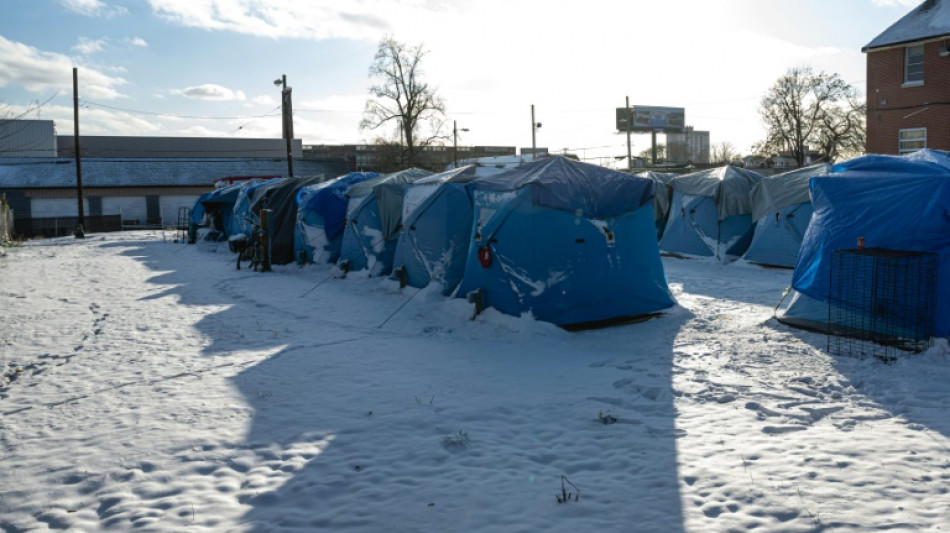
SCS
0.0200


A fearsome winter storm continued to pummel parts of the United States with blizzard conditions Saturday evening after its powerful Arctic winds left over a million customers without power earlier in the day and caused Christmas travel nightmares.
At least 17 weather-related deaths have been confirmed across eight states as heavy snow, howling winds and dangerously frigid temperatures kept much of the nation, including the normally temperate south, in a frozen grip for a third straight day.
In hard-hit New York state, Governor Kathy Hochul deployed the National Guard to Erie County and its main city Buffalo, where authorities said emergency services have essentially collapsed in the face of extreme blizzard conditions.
The National Weather Service warned that blizzard conditions in the Great Lakes region caused by lake-effect snow will continue into Saturday night, including in Buffalo.
One couple in the lake-side city, which sits across the border from Canada, told AFP that with the roads completely impassible, they would not be making a 10-minute drive to see their family for Christmas.
"It's tough because the conditions are just so bad... a lot of fire departments aren't even sending out trucks for calls," said 40-year-old Rebecca Bortolin.
Her fiance Ali Lawson is having back pain, but plans to tough it out at home because driving to the hospital is just too dangerous.
"We can currently see across the street, but last night we couldn't see past our porch," said Lawson.
The "bomb cyclone" winter storm, one of the fiercest in decades, had already forced the cancellation of over 3,300 US flights on Saturday and the delay of nearly 7,500 more, a day after nearly 6,000 were scrapped, according to tracking website Flightaware.com.
Transportation Secretary Pete Buttigieg tweeted Saturday that "the most extreme disruptions are behind us as airline and airport operations gradually recover" -- words that travelers stranded at airports including Atlanta, Chicago, Denver, Detroit and New York were holding on to.
New York City resident Zack Cuyler, whose flight home to Houston on December 22 has been postponed then canceled twice this week already, was "pretty steamed" about the chaos.
The 35-year-old now hopes to reach his loved ones by December 25. "I'm just glad I'll get to see my family for Christmas," he told AFP.
Road ice and white-out conditions also led to the closure of some of the nation's busiest transport routes, including the cross-country Interstate 70, parts of which were temporarily shut down in Colorado and Kansas.
The National Weather Service warned about lethal conditions and urged residents in affected areas to remain indoors. On Friday, it said wind chills had sent temperatures plunging to -55 Fahrenheit (-48 Celsius).
At one point during the day, nearly 1.7 million customers were without electricity in the biting cold, according to tracker poweroutage.us.
Though power had largely been restored by late Saturday, people were urged to conserve electricity and rolling blackouts were instituted in some parts of the country, including in North Carolina.
- Frustration growing -
In El Paso, Texas, desperate migrants who had crossed from Mexico huddled for warmth in churches, schools and a civic center, Rosa Falcon, a school teacher and volunteer told AFP.
But some still chose to stay outside in frigid temperatures because they feared attention from immigration authorities, she added.
In Chicago, Burke Patten of Night Ministry, a nonprofit dedicated to helping the homeless, said: "We've been handing out cold weather gear, including coats, hats, gloves, thermal underwear, blankets and sleeping bags, along with hand and foot warmers."
Weather officials forecast that dangerously cold conditions would continue throughout the central and eastern United States over the weekend before temperatures returned to more normal seasonal weather next week.
Canadian authorities have also issued severe weather warnings. Hundreds of thousands were left without power in Ontario and Quebec provinces, while many flights were canceled at airports in Vancouver, Toronto and Montreal.
VIA Rail, Canada's passenger service, said that all trains from Toronto to Ottawa and Montreal would be suspended on Christmas Day due to a train derailment, while "extreme weather conditions" forced many other cancellations.
- Flooding, fierce winds -
In the US, transportation departments in several plains states reported near-zero visibility whiteouts, ice-covered roads and blizzard conditions, and strongly urged residents to stay home.
Drivers were being warned not to take to the roads -- even as the nation reached what is usually its busiest time of year for travel.
Meteorologist Kelsey McEwen in Toronto tweeted that waves of up to 26 feet (eight meters) were reported in Lake Erie, while in Ohio's Fairport Harbor, winds gusted to 74 miles (120 kilometers) per hour, according to the NWS.
burs-st/mlm/md/des/md
C.Mak--ThChM